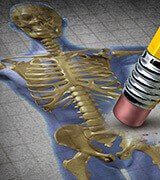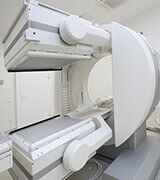Recognizing Possible Long-term Side-Effects Radiation Therapy
As cancer patients live longer, information emerges about radiation's long-term effects.
We’ve come a long way since 1903 when Marie and Pierre Curie first introduced radiation therapy as a means of treating cancer and lupus. The field of radiation oncology is continually being improved to provide patients with better long term disease outcomes, and fewer long term side effects. This is still a relatively new treatment modality when it comes to following patients over their lifespan. Earlier detection and more effective treatments mean patients are living longer — in many cases, living well into old age. Until recently, long term side effects were not easily recognized simply because there had not been a significant population to observe.
 While not everyone undergoing radiation therapy will experience more than the short term discomfort of sensitive skin or the frustration of feeling wiped out physically, there are some possible long term issues. For many women, the end of their radiation treatments is the end of their treatment for cancer. It is not, however, the end of their need to know what to expect.
While not everyone undergoing radiation therapy will experience more than the short term discomfort of sensitive skin or the frustration of feeling wiped out physically, there are some possible long term issues. For many women, the end of their radiation treatments is the end of their treatment for cancer. It is not, however, the end of their need to know what to expect.
It is important to remember that most women will never experience any of these. It’s also highly unlikely that anyone would experience all of them.
Changes to the skin
Irradiated skin is often slightly darker, thinner or dryer than it was before. Your skin may also burn more easily from sun exposure, and be prone to infection and breakdown. Operation scars often remain tender or sensitive for a long time after treatment ends. Some women develop changes which can include small red blotches on the breast caused by dilated blood vessels under the skin. This condition is known as telangiectasia (spider veins). Telangiectasias are not a sign of a cancer recurrence, but they usually do not go away on their own.
Be sure to use creams, lotions and oils specifically designed for sensitive skin. You will want to avoid products containing perfumes or other chemicals. Talk to a dermatologist to find products that are appropriate. Many women continue to use pure Aloe Vera on the affected areas as a safe and effective means of soothing radiated skin.
Long term changes to the breast
Oedema (or swelling of the breast) may persist for months or years after treatment.
A different type of swelling called lymphoedema can also develop. This, unfortunately, is very common and can occur if the lymph nodes have been removed or are damaged by radiation, causing a buildup of lymph fluid. It more commonly affects the arm, but can also cause swelling of the breast.
Lymphoedema can develop many months or even years after treatment has finished. While it is not curable, there are treatment modalities that provide relief, so if you experience this problem it’s important to talk to your doctor to discuss your options.
A few women develop a hardening or thickening of the breast tissue (fibrosis). This can cause the breast to become harder and smaller than it was. In severe cases this can make the radiated breast appear much different than the healthy breast.
Some women find that as they get older or gain weight their breasts tend to become larger. A breast that has been treated with radiation may not increase in size as much as the untreated breast. When this is a problem women often use a partial prosthesis or correct the imbalance through surgery.
Many women find that the area in the breast that has been treated remains uncomfortable or sensitive. This generally become less of a problem as time passes. Some women find help relieving the symptoms by wearing a support bra during the day with a soft bra or camisole at night.
Restricted arm and shoulder movement
It’s fairly common for women who have radiotherapy to the area under the arm to experience some restriction in movement, especially if they’ve had surgery to their underarm area as well. This may make it difficult to carry heavy objects, perform other tasks that require lifting, or do certain types of exercise.
 Many women find relief through gentler exercise modalities like yoga. Yoga allows the practitioner to stretch while learning how to use the breath as both a calming influence and a means to increased flexibility.
Many women find relief through gentler exercise modalities like yoga. Yoga allows the practitioner to stretch while learning how to use the breath as both a calming influence and a means to increased flexibility.
Massage therapy has also proven useful. Discussing the fact you’ve had radiation therapy and your limited range of motion is very important when you are looking for someone to help you either in terms of exercise or massage. You will want to make sure they are well-versed in helping women overcome these challenges. There are individuals who specialize or have had training specific to these needs.
When the heart is affected
When undergoing radiation treatments, there is a very small risk of damage to the heart muscle or the major blood vessels around the heart. This is a potential problem if you have had cancer in your left breast, since the heart is on the left side of the chest. Ideally, the heart is either not within the radiation area or only a small amount of the heart will receive any radiation, which helps to lower the risk of significant damage.
 If your heart has been damaged by radiotherapy you may find that you get tired very easily or get breathless on exertion, like climbing stairs. You may also notice that you sometimes feel dizzy or get chest pains. It’s important to remember that these symptoms can be caused by many things and they aren’t always a result of damage to the heart. You will want to immediately consult your doctor if you experience any symptoms that may be heart related. (More about your heart and breast cancer treatment.)
If your heart has been damaged by radiotherapy you may find that you get tired very easily or get breathless on exertion, like climbing stairs. You may also notice that you sometimes feel dizzy or get chest pains. It’s important to remember that these symptoms can be caused by many things and they aren’t always a result of damage to the heart. You will want to immediately consult your doctor if you experience any symptoms that may be heart related. (More about your heart and breast cancer treatment.)
A promising clinical trial is underway at the Johns Hopkins Avon Foundation Breast Center to determine if The Active Breath Control device will help to better protect women against heart-related side effects. The device provides an innovative way for the patient’s heart to be spared radiation by controlling her breathing during the actual radiation treatment.
Possible lung problems
A small number of women develop symptoms such as breathlessness, a dry cough or chest pain. These symptoms may occur because the radiotherapy can damage the cells lining the lungs, causing inflammation or a hardening and thickening (fibrosis). The changes are usually temporary, lasting a month or two, but occasionally can become a long-term side effect. Your risk of developing lung problems is slightly higher if you’ve had lymph nodes radiated in your chest area and/or you’ve had chemotherapy.
Talk to your doctor if you notice any lung problems. They may be able to give you inhalers to help open up the airways or steroids to reduce inflammation.
If the bones are affected
 A rare late side effect of radiotherapy to the breast is damage to the bones, especially the ribs. The bones can become thinner and more brittle if you had certain chemotherapy drugs while undergoing radiation. If this happens, it can cause pain and make it hard for you to lift heavy objects or to exercise.
A rare late side effect of radiotherapy to the breast is damage to the bones, especially the ribs. The bones can become thinner and more brittle if you had certain chemotherapy drugs while undergoing radiation. If this happens, it can cause pain and make it hard for you to lift heavy objects or to exercise.
It’s important to be aware that this problem can happen, so that if you have any symptoms you can get them checked by your doctor.
Hypothyroidism
Hypothyroidism (abnormally low levels of thyroid hormone) is one of the more frequently encountered late complications of radiation therapy. Although it occurs most frequently when the neck has been radiated, it is important for patients who have received radiation therapy to be tested on a regular basis because signs and symptoms of hypothyroidism occur very late and are subtle.
These may include:
- Fatigue
- Sluggishness
- Increased sensitivity to cold
- Consitpation
- Pale, dry skin
- A puffy face
- Hoarse voice
- An elevated blood cholesterol level
- Unexplained weight gain
- Muscle aches, tenderness and stiffness
- Pain, stiffness or swelling in your joints
- Muscle weakness
- Heavier than normal menstrual periods
- Brittle fingernails and hair
- Depression
- Numbness, pain and weakness in the arm
 About 1 in 100 women who have radiotherapy to the underarm will develop some numbness and tingling, weakness, and/or pain in the hand, shoulder or arm. The symptoms are due to damage to the nerves going into the arm. These nerves are known as the brachial plexus and the long-term side effect is often called radiation-induced brachial plexus neuropathy or brachial plexopathy.
About 1 in 100 women who have radiotherapy to the underarm will develop some numbness and tingling, weakness, and/or pain in the hand, shoulder or arm. The symptoms are due to damage to the nerves going into the arm. These nerves are known as the brachial plexus and the long-term side effect is often called radiation-induced brachial plexus neuropathy or brachial plexopathy.
If severe brachial plexopathy develops it cannot be reversed. However, treatments can help to control symptoms making life a bit easier. Acupuncture, physical therapy, massage or applying heat and cold can help relieve symptoms.
Using a TENS machine (transcutaneous electrical nerve stimulations) can be a very effective way to relieve pain. It involves placing sticky pads that contain electrodes onto your skin. A weak (painless) electrical current is passed through the pads. The electrical current can make the body release its own natural painkillers (endorphins), to help control pain.
Radiation-induced second cancers
According to a long-term study of more than 600,000 cancer survivors by U.S. National Cancer Institute researchers, an estimated eight percent of second cancers were attributable to radiation treatment for the original cancer.
The area treated is important, since these cancers tend to develop in or near the area that was treated with radiation. Certain organs, such as the breast and thyroid, seem to be more likely to develop cancers after radiation than others.
Some types of leukemia are by-products of radiation therapy, and the American Cancer Society estimates that the risk is at its highest five to nine years after the radiation treatment, and then slowly goes down. Other kinds of cancers that have been related to radiation tend to occur more than 10 years after treatment.
With so many women receiving radiation therapy for the treatment of breast cancer, there’s hope that more discussion will take place about its long term side effects; meanwhile, these individuals go on to lead long and otherwise healthy lives. If you, or someone you know, has something to add to this discussion, we would love to hear from you so this information can be shared. Visit our Facebook page and leave a comment.







